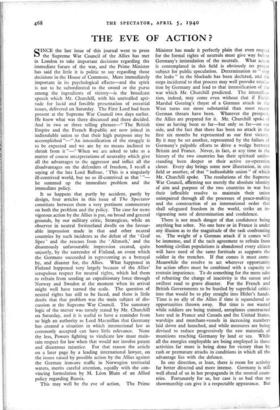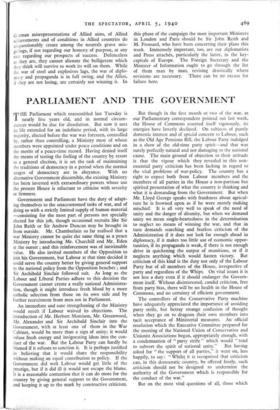THE EVE OF ACTION ?
SINCE the last issue of this journal went to press the Supreme War Council of the Allies has met in London to take important decisions regarding the immediate future of the war, and the Prime Minister has said the little it is politic to say regarding those decisions in the House of Commons. More immediately important in its psychological effects—and the spirit is not to be subordinated to the sword or the purse among the ingredients of victory—is the broadcast speech which Mr. Churchill, with his unrivalled apti- tude for lucid and forcible presentation of essential issues, delivered on Saturday. The First Lord had been present at the Supreme War Council two days earlier. He knew what was there discussed and there decided. And in two or three telling phrases—" The British Empire and the French Republic are now joined in indissoluble union so that their high purposes may be accomplished "—" An intensification of the struggle is to be expected and we are by no means inclined to shrink from it "—" When we are asked to take as a matter of course Interpretations of neutrality which give all the advantages to the aggressor and inflict all the disadvantages on the defenders of freedom, I recall a saying of the late Lord Balfour, ' This is a singularly ill-contrived world, but no so ill-contrived as that ' "- he summed up the immediate problem and the immediate policy.
It so happens that partly by accident, partly by design, four articles in this issue of The Spectator constitute between them a very pertinent commentary on both the problem and the policy. The case for more vigorous action by the Allies is put, on broad and general grounds, by our military critic, Strategicus, while an observer in neutral Switzerland dwells on the favour- able impression made in that and other neutral countries by such incidents as the defeat of the ' Graf Spee ' and the rescues from the Altmark,' and the disastrously unfavourable impression created, quite unjustly, by the surrender of Finland, an event which the Germans succeeded in representing as a betrayal by, and disaster for, the Allies. What happened in Finland happened very largely because of the Allies' scrupulous respect for neutral rights, which led them to refrain from sending an expeditionary force through Norway and Sweden at the moment when its arrival might well have turned the scale. The question of neutral rights has still to be faced, and there is little doubt that that problem was the main subject of dis- cussion at the Supreme War Council. The summary logic of the matter was tersely stated by Mr. Churchill on Saturday, and it is useful to have a reminder from so high an authority as Lord Macmillan that Germany has created a situation in which international law as commonly accepted can have little relevance. None the less, Powers fighting to vindicate law must main- tain respect for law when that would not involve patent and disastrous injustice. For that reason the article on a later page by a leading international lawyer, on the issues raised by possible action by the Allies against the German iron-ore traffic in Norwegian territorial waters, merits careful attention, equally with the con- vincing formulation by M. Leon Blum of an Allied policy regarding Russia.
This may well be the eve of action. The Prime
Minister has made it perfectly plain that even respect for the formal rights of neutrals must give way before Germany's intimidation of the neutrals. What action is contemplated in this field is obviously no proper subject for public speculation. Determination to " stop the leaks " in the blockade has been declared, and the steps incidental to that process may well provoke retalia- tion by Germany and lead to that intensification of the war which Mr. Churchill predicted. The intensifica- tion, indeed, may come even without that if Field- Marshal Goering's threat of a German attack in the West turns out more substantial than most recent German threats have been. Whatever the prospect, the Allies are prepared for it. Mr. Churchill spoke of time as having been so far—but only so far—on our side, and the fact that there has been no attack in the first six months he represented as our first victory. By it may be set another, represented by the failure of Germany's palpable efforts to drive a wedge between Britain and France. Never, in fact, at any time in the history of the two countries has their spiritual under- standing been deeper or their active co-operation closer. Every day brings some new illustration, in one field or another, of that " indissoluble union " of which Mr. Churchill spoke. The resolutions of the Supreme War Council, affirming not merely the absolute identity of aim and purpose of the two countries in war but their inflexible resolve to maintain their union unimpaired through all the processes of peace-making and the construction of an international order that shall safeguard freedom in the world, strike an in- vigorating note of determination and confidence.
There is not much danger of that confidence being anything but sober.. No one here or in France is under any illusion as to the magnitude of the task confronting us. The weight of a German attack if it comes will be immense, and if the tacit agreement to refrain from bombing civilian populations is abandoned every citizen will have need of the same fortitude as supports the soldier in the trenches. If that comes it must come. Meanwhile the resolve to act wherever opportunity for action offers must be combined with a capacity to restrain impatience. To do something for the mere sake of rebutting the charge of inactivity is the surest and swiftest road to grave disaster. For the French and British Governments to be hustled by superficial critics into that would be to play straight into Hitler's hands. Time is no ally of the Allies if time is squandered or opportunities thrown away. But time is not wasted while soldiers are being trained, aeroplanes constructed here and in France and Canada and the United States, warships and merchant-vessels in increasing numbers laid down and launched, and while measures are being devised to reduce progressively the raw materials of munitions reaching Germany by land or sea. While all the energies employable are being employed in those activities far more is being done for victory than by rash or premature attacks in conditions in which all the advantage lies with the defence.
In one direction, at least, there is room for activity far better directed and more intense. Germany is still well ahead of us in her propaganda in the neutral coun- tries. Fortunately for us, her case is so bad that no showmanship can give it a respectable appearance. But
German misrepresentations of Allied aims, of Allied achievements and of conditions in Allied countries do unquestionably create among the neutrals grave mis- givings, if not regarding our honesty of purpose, at any rate regarding our prospects of success. Defenceless as they are, they cannot alienate the belligerent which they think will survive to work its will on them. While the war of steel and explosives lags, the war of diplo- macy and propaganda is in full swing, and the Allies, if they are not losing, are certainly not winning it In
this phase of the campaign the most important Ministers in London and Paris should be Sir John Reith and M. Frossard, who have been concerting their plans this week. Immensely important, too, are our diplomatists and Press attaches, particularly the latter, in the key- capitals of Europe. The Foreign Secretary and the Minister of Information ought to go through the list of them man by man, revising drastically where revisions are necessary. There can be no excuse for failure here.















































 Previous page
Previous page